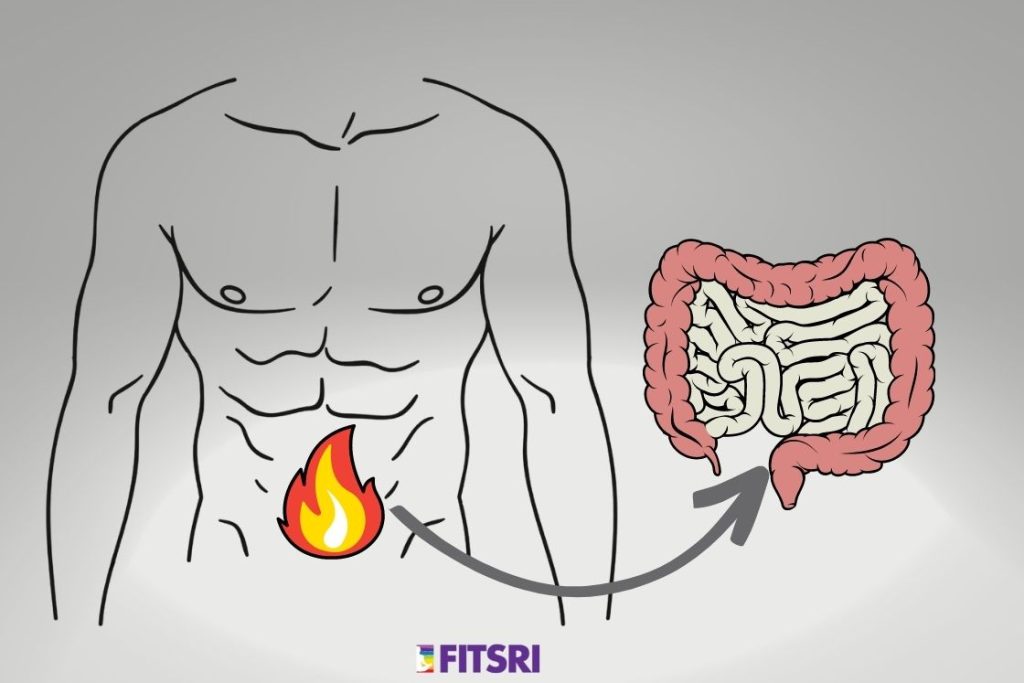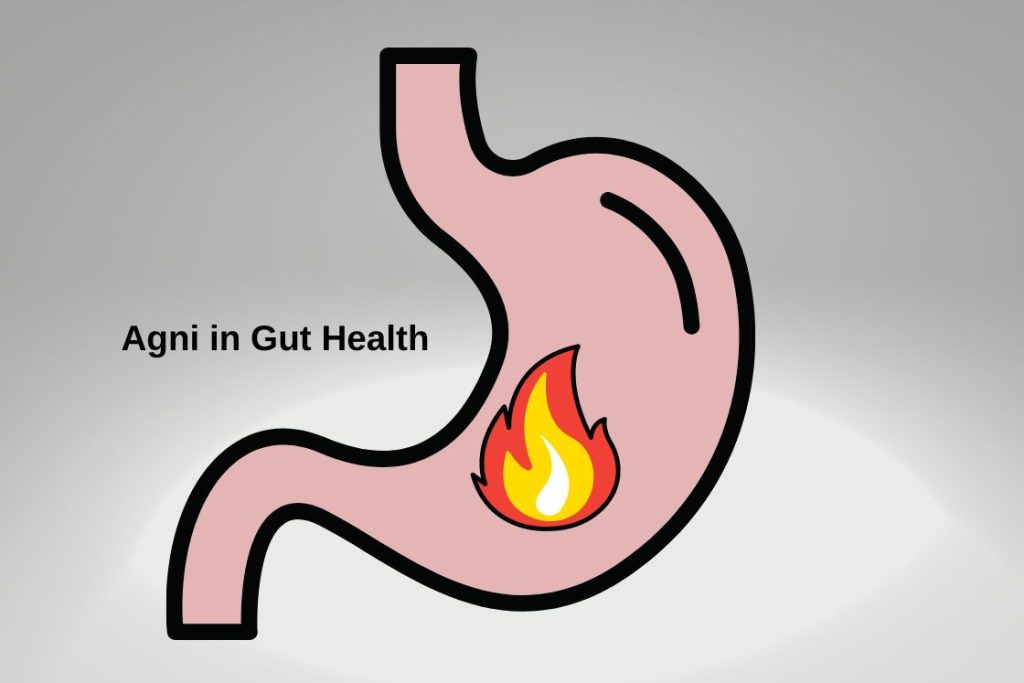- What is Agni?
- Types of Agni in Ayurveda
- The Role of Agni in Gut Health
- Signs of Balanced and Imbalanced Agni

Ayurveda, a time-tested system of medicine originating in India, focuses on achieving balance in the body and mind. It promotes holistic health by considering the interplay of bodily systems, the external environment, and emotional well-being. One of its central concepts is Agni.
Agni, a cornerstone of Ayurveda, is deeply rooted in ancient Indian medicinal texts. It is regarded as a transformative force within the holistic health framework of Ayurveda, balancing the mind and body. Ayurvedic sages and practitioners historically placed paramount importance on Agni, viewing it as a bridge between the physical and subtle body and the surrounding environment.
What is Agni? | Agni as the ‘Digestive Fire’
Agni, directly translated, means “fire” in Sanskrit. In the Ayurvedic context, it refers to the body’s digestive and metabolic power. It plays a central role in processing the food we eat, converting it into energy, and ensuring nutrients reach every cell. When Agni functions optimally, digestion becomes efficient, and metabolic processes remain balanced.
Moreover, gut health extends beyond just digesting food. A healthy gut forms the foundation of overall well-being, influencing everything from immunity to mood. By recognizing and nurturing Agni, we can support our gut to function as an ally, fostering health and vitality.
The multifaceted importance of Agni in ayurveda:
The influence of Agni goes far beyond digestion. Its efficiency and balance affect a wide range of bodily functions and aspects of well-being:
- Bala (Strength): A robust Agni contributes to physical vigor and endurance.
- Varna (Colour): It influences skin clarity and hue, reflecting overall health.
- Swasthya (Health): Proper functioning of Agni ensures holistic health and keeps illnesses at bay.
- Utsaha (Enthusiasm): When Agni functions harmoniously, it nurtures a positive mindset and enthusiasm for life’s endeavors.
- Upacaya (Development of the body): Agni aids in the overall growth and development of bodily tissues.
- Prabha (Complexion): It plays a role in giving the skin its radiance and glow.
- Ojas (Vitality): Often considered the essence of health in Ayurveda, Ojas is bolstered by a balanced Agni.
- Tejas (Valour): Agni fuels courage and determination, enabling individuals to face challenges head-on.
- Vaya (Aging): A harmonized Agni slows down premature aging, supporting longevity.
- Ayu (Lifespan): The overall lifespan, according to Ayurveda, is influenced by the state of one’s Agni, highlighting its crucial role in health and longevity.
Pitta & agni in ayurveda: An intertwined relationship

In Ayurveda, there are three primary doshas, or energies: Vata, Pitta and Kapha. Among them, Pitta is closely associated with heat and transformation. Agni, the force behind digestion and metabolism, is a vital aspect of Pitta. Think of Pitta as the overarching energy that governs heat, transformation, and metabolism in the body, while Agni is the specific agent responsible for digesting food and absorbing nutrients. Thus, understanding and balancing Pitta is crucial for maintaining healthy Agni.
Know your Body Type: Join our 5 Day Ayurveda Workshop
The 13 types of Agni in ayurveda

Jatharagni – The Primary Digestive Fire:
This is the main Agni that operates in the stomach and intestines, responsible for digesting food we consume. Depending on its state, at a given moment the Agni in your digestive tract, or Jatharagni, can be either of the four types:
- Vishamagni: This type of Agni is erratic or irregular. On some days, you might feel extremely hungry, and on others, you might have little to no appetite. This can lead to digestive issues like gas or constipation.
- Tikshagni: This is an overactive digestive fire. If you have Tikshagni, you may constantly feel hungry and might digest food quickly, but this can sometimes lead to inflammation or hyperacidity.
- Mandagni: A slow and sluggish digestive fire. With Mandagni, the food isn’t digested properly or in a timely manner, often leading to indigestion or weight gain.
- Samagni: The ideal state of digestion. It represents a balanced digestive fire, where the food is processed efficiently, leading to proper absorption of nutrients.
Bhutagni – The Elemental Agnis:
These are associated with each of the five fundamental elements (Panchamahabhutas) that make up everything in the universe, including our bodies.
Parthiva Agni: Related to the Earth element, it helps in processing solid particles of food.
Apya Agni: Governs the Water element, it aids in metabolizing liquids.
Tejas Agni: Connected to the Fire element, it’s crucial in digestion and providing warmth to our body.
Vayavya Agni: Linked to the Air element, it plays a role in gas exchange and breathing.
Nabhasa Agni: Associated with the Ether/Space element, it might be a bit abstract but think of it as managing hollow spaces and channels in the body.
Dhatvagni – Agnis of the Body Tissues:
The human body, according to Ayurveda, is composed of seven primary tissues. Each tissue has its own Agni responsible for its metabolism:
- Rasagni: Operates in the Rasa Dhatu, or plasma. It’s vital for nutrient distribution throughout the body.
- Raktagni: Governs the Rakta Dhatu or blood tissue. It ensures that oxygen and nutrients are delivered to every cell.
- Mamsagni: Works in the Mamsa Dhatu, the muscle tissue. It’s important for muscle health, repair, and growth.
- Medagni: Functions in the Meda Dhatu, or fat tissue. It regulates lipid metabolism, ensuring a balance between fat storage and usage.
- Asthyagni: Operates in the Asthi Dhatu, the bone tissue. It plays a crucial role in bone health, density, and regeneration.
- Majjagni: Works in the Majja Dhatu, the bone marrow and nerve tissue. It aids in producing new blood cells and maintaining nervous system health.
- Shukragni: Operates in the Shukra Dhatu, or reproductive tissue. It plays a part in fertility, vitality, and overall reproductive health.
In essence, these 13 Agnis collectively ensure that every part of our food is digested and every part of our body is nourished. Understanding them provides insights into our unique body constitution, helping us cater to our personal health needs more effectively.
The role of Agni in gut health

Gut health, often considered a mirror to one’s overall well-being, has a central player in the Ayurvedic framework: Agni. But what exactly does Agni have to do with the intricate workings of our digestive system? Let’s break it down.
1. Agni’s task of food breakdown and nutrient absorption
At its core, Agni is our body’s internal mechanism for digesting food and extracting the essential nutrients. Think of it as a furnace that processes what we eat. When Agni functions effectively, our food is broken down efficiently, and all the vital nutrients are seamlessly absorbed into our system, ensuring we’re energized and nourished.
2. The perils of an imbalanced agni and the emergence of ama
Now, imagine what happens if the furnace isn’t working correctly. Inefficient burning leads to remnants. In Ayurveda, this residue from incompletely digested food is termed “Ama.” Ama is likened to a toxic byproduct that accumulates in the body. Over time, this build-up can obstruct our physiological pathways, leading to various health issues, from bloating and gas to more severe digestive disorders. It’s not just about feeling heavy after a meal; it’s about the long-term implications of carrying around these toxins.
3. Ayurveda Agni, gut flora, and overall gut health
The modern understanding of gut health places significant emphasis on gut flora, the community of beneficial bacteria residing in our intestines. These microorganisms play a pivotal role in digestion, nutrient absorption, and immune function. Agni and gut flora are intertwined in their missions. A robust Agni supports a healthy gut environment, ensuring these beneficial bacteria thrive. In contrast, a weakened Agni can disrupt this harmony, potentially leading to imbalances in the gut flora, further exacerbating digestive issues.
In essence, Agni’s role in gut health is profound. It’s not just a background player; it’s at the forefront, determining how we process our food, how we absorb nutrients, and how we maintain a balanced gut environment. Ensuring Agni is in optimal condition is paramount for those aiming for holistic gut health and, by extension, overall well-being.
Agni in ayurveda and metabolism
Metabolism, a term you might often hear in discussions about weight or energy levels, has a parallel in the world of Ayurveda known as Agni. Let’s delve deeper into this connection.
1. Metabolism: A dual perspective
In the Western context, metabolism is broadly described as the chemical processes within our bodies that convert food into energy, essential for tasks like breathing, thinking, and physical activity. On the other hand, Ayurveda introduces us to Agni as not just a process, but an entity. Agni governs digestion, assimilation, and transformation of food and experiences into energy or consciousness. While both perspectives might sound distinct, they converge on a shared principle: the transformation of what we intake into energy.
2. Agni’s influence on metabolic rate and energy production
Agni is the driving force behind how swiftly and efficiently our body processes what we consume. A robust and active Agni means our metabolic rate is in good gear, ensuring that food is promptly converted to energy. In simpler terms, if Agni is in tip-top condition, our bodies are better equipped to produce energy and maintain vitality.
3. The domino effect of imbalanced Agni
When Agni is out of balance, it’s not just an isolated concern. An imbalanced Agni can slow down our metabolic rate, leading to inefficient energy production. This sluggishness can result in weight gain or challenges in weight management. Beyond weight, a disrupted Agni can leave individuals feeling perpetually drained, lacking the vitality to go about their day-to-day tasks. The ripple effects of an impaired Agni touch various aspects of health, underscoring the importance of maintaining its balance for overall well-being.
To put it succinctly, Agni’s relevance in our metabolic processes is immense. It’s the linchpin that determines how we utilize our food, how we manage our weight, and how energized we feel. Recognizing and respecting its role is a step towards holistic health and wellness.
Signs of balanced and imbalanced Agni in ayurveda
So far we have discussed how Agni, the internal digestive fire, influences our health at its very core. But how can one discern if their Agni is harmoniously burning or has gone astray? Let’s decode the signs.
1. Hallmarks of harmonious Agni
When your Agni is in sync, it reveals itself through:
- Consistent Digestion: Meals are digested without bouts of bloating, gas, or indigestion.
- Steady Energy Levels: You feel energetically stable throughout the day, devoid of dramatic slumps.
- Clear Complexion: Your skin exhibits a natural glow, without frequent breakouts or pallor.
- Optimal Elimination: Daily bowel movements are regular and unstrained.
- Mental Clarity: There’s an absence of foggy-headedness, allowing for clear thought processes.
2. Red flags of disrupted Agni
On the flip side, an Agni that’s out of balance can manifest as:
- Irregular Digestion: Episodes of heartburn, bloating, or constipation become frequent visitors.
- Fluctuating Energy: You might experience surges of energy followed by intense fatigue.
- Unexplained Weight Changes: Either unanticipated weight gain or unexplained weight loss might occur.
- Mood Swings: Feelings of irritability, anxiety, or general moodiness might prevail.
- Taste Disturbances: A recurring bad taste in the mouth or lack of taste can be indicative.
3. Broader implications of agni imbalances
Beyond these immediate signs, a long-term imbalanced Agni doesn’t merely stay confined to digestive issues. It can pave the way for:
- Weakened Immunity: Increased susceptibility to infections and illnesses.
- Chronic Conditions: Persistent imbalances can lead to ailments like irritable bowel syndrome, diabetes, or skin disorders.
- Mental Health Concerns: Issues such as depression or anxiety can be exacerbated or triggered by prolonged Agni disruptions.
In essence, the state of our Agni provides a window into our holistic health. Recognizing its signs, both harmonious and disruptive, is vital. By understanding these indicators, one can take proactive steps to nurture their Agni, laying the groundwork for comprehensive well-being.
Tips to balance and strengthen Agni
A balanced Agni is synonymous with optimal health in Ayurveda. For those seeking to tune their inner digestive fire to its prime, here are actionable tips rooted in ancient wisdom and contemporary understanding.
1. Dietary recommendations
- Warm and Cooked Foods: Favor warm, cooked meals over cold or raw items. This eases the digestion process, helping Agni function efficiently.
- Avoid Overeating: Listen to your body’s cues. Stop eating when you’re about three-quarters full to avoid overwhelming your Agni.
- Limit Processed Foods: Opt for whole, natural foods, steering clear of overly processed or artificial items which can dampen Agni.
2. Lifestyle practices
- Regular Meal Timings: Stick to a consistent eating schedule. This trains your Agni to anticipate and prepare for digestion.
- Morning Routine: Starting the day with a glass of warm water can ignite the Agni, prepping it for the day’s meals.
- Meditation: Incorporating meditation can help in reducing stress, which, in turn, supports a balanced Agni.
- Physical Activity: Regular exercise, especially in the early morning, can stoke your Agni, ensuring efficient digestion.
3. Ayurvedic boosters for agni
- Trikatu: A blend of black pepper, long pepper, and ginger, Trikatu is renowned for its Agni-enhancing properties.
- Ginger: Consuming a small piece of fresh ginger with a pinch of salt before meals can rev up your digestive fire.
- Ayurvedic Therapies: Treatments like Abhyanga (oil massage) can also aid in balancing and strengthening Agni.
4. The essence of mindful eating
- Conscious Consumption: Pay attention to what you eat. Relish each bite, recognizing the flavors and textures. This conscious approach aids digestion.
- Limit Distractions: Eating without the interference of screens or intense discussions allows the body to focus solely on the act of digestion.
- Tune Into Hunger Cues: Understand the difference between emotional eating and genuine hunger. Responding accurately to these signals ensures that Agni functions at its best.
5. How to control Tikshna Agni, or Tikshagni
- Cooling Foods: Incorporate foods that have cooling properties, like cucumbers, dairy products (particularly ghee and milk), and leafy greens.
- Limit Spicy Foods: Reduce the intake of overly spicy or tangy foods. These can fan the flames of Tikshagni.
- Stay Hydrated: Drinking sufficient water is crucial. However, avoid excessive water intake during meals, as it can dilute digestive enzymes.
- Regular Meal Times: Stick to regular meal times and avoid skipping meals.
- Stay Cool: Physically cooling down, such as avoiding direct sunlight or heat and not overexerting oneself, can assist in managing Tikshagni.
- Amla: Known for its cooling effect, amla or Indian gooseberry can help balance Tikshagni.
- Coriander Water: Soak coriander seeds in water overnight. Drink this water in the morning to calm the digestive system.
- Avoid Stimulants: Reduce or eliminate consumption of tobacco, caffeine, and alcohol as they can aggravate Tikshagni.
6. Mandagni treatment in ayurveda
- Warm Foods: Opt for warm, cooked meals rather than cold or raw foods.
- Include Spices: Spices like ginger, black pepper, and cumin can help ignite the digestive fire. A pinch of ginger and a dash of lime before meals can be beneficial.
- Avoid Heavy Foods: Reduce the consumption of foods that are difficult to digest, like fried foods, red meat, or overly rich dishes.
- Physical Activity: A light exercise routine, including a morning or evening walk, can help stimulate digestion.
- Abdominal Massages: Gentle massages using warm sesame oil can promote better digestion.
- Warm Water: Drinking warm water throughout the day can help elevate Mandagni and facilitate digestion.
The connection between Agni, gut health, and immunity
Our gut is not merely an organ system that processes food. Modern science, paired with ancient Ayurvedic wisdom, sheds light on its profound influence on overall health, particularly immunity. Let’s explore this intricate connection.
1. The Gut: More than digestion
- Second Brain Dynamics: The gut, often referred to as the body’s ‘second brain,’ houses millions of nerve cells. These not only orchestrate digestion but also communicate with our brain, affecting mood and cognition.
- Immunity’s Command Center: A staggering 70% of our immune cells reside in the gut. This makes the gut a frontline defender against pathogens, ensuring that harmful entities don’t breach our body’s defenses.
2. Agni: The torchbearer of immunity
- Digestion and Beyond: A strong Agni ensures efficient digestion, reducing the chance of undigested food particles becoming toxins that can hinder immunity.
- Barrier Maintenance: Agni aids in maintaining the integrity of the gut lining. A robust lining prevents unwanted particles from entering the bloodstream, a crucial aspect of immune defense.
- Harmony in the Gut: Properly balanced Agni fosters a conducive environment for beneficial gut bacteria. These microbes play a pivotal role in immune responses.
3. Ayurveda’s Gut-Centric health viewpoint
- Foundation of Wellness: Ayurveda has long held the belief that gut health is the cornerstone of overall well-being. An imbalanced digestive system, as per Ayurveda, can be the root cause of many ailments.
- Holistic Approach: Unlike the compartmentalized view of health in some traditions, Ayurveda emphasizes the interconnectedness of systems. The gut isn’t an isolated unit but an integral part of the body’s intricate web.
- Agni’s Central Role: In Ayurvedic teachings, nurturing Agni is synonymous with fostering health. It’s not just about food digestion but about processing emotions, experiences, and energies effectively.
Drawing from both time-tested Ayurvedic principles and contemporary scientific insights, it becomes clear that our gut, governed by the might of Agni, is a powerhouse influencing immunity. Prioritizing gut health and a balanced Agni can be transformative, not just for digestion but for holistic well-being.
To Conclude
Navigating the intricate tapestry of Ayurvedic wisdom, our exploration into the realm of Agni has shed light on its profound significance. More than just a concept, Agni stands as the sentinel governing our gut health, metabolism, and by extension, our overall vitality.
- Beyond Digestion: While Agni plays a pivotal role in breaking down our meals, its influence transcends digestion. It shapes our metabolic processes, ensuring that our body efficiently harnesses energy from what we consume.
- Guardian of Gut and Immunity: An optimized Agni acts as a guardian, ensuring the health of our gut—a crucial player in our immune responses. Thus, by nurturing Agni, we indirectly fortify our defenses against potential health adversaries.
Ayurveda, with its millennia-old insights, offers a holistic approach to health. It doesn’t just target symptoms but seeks to address root causes, fostering holistic well-being. Adopting Ayurvedic principles needn’t be an overhaul of one’s lifestyle. Simple, incremental changes—like being mindful of one’s diet or recognizing the importance of Agni—can yield transformative results.
To navigate the ebb and flow of life with vitality, understanding and cherishing our Agni is paramount. As we close this chapter, let’s carry forward the essence of what we’ve learned, intertwining Ayurvedic insights into our daily lives, paving the path for a harmonious existence.
FAQs on Agni in Ayurveda
1. What are the qualities of Agni in ayurveda?
In Ayurveda, Agni embodies qualities such as warmth, transformation, and light. It represents the vital force behind digestion and metabolism, responsible for converting food and other inputs into energy and sustenance for the body.
2. What chakra is Agni?
Agni is primarily associated with the Manipura Chakra, also known as the Solar Plexus Chakra. Located in the navel region, this chakra governs personal power, will, and digestion, aligning with the transformative qualities of Agni.
3. How do I activate Agni?
Activating Agni involves a combination of dietary, lifestyle, and mindful practices. Consuming warm, cooked foods, sipping warm water throughout the day, and incorporating spices like ginger and black pepper can help. Regular physical activity, meditation, and maintaining a consistent meal routine also contribute to a vibrant Agni.
4. What is the difference between Pitta and Agni?
Agni pertains to the digestive and metabolic fire, responsible for the transformation processes in the body. Pitta, on the other hand, is one of the three doshas (body-mind constitutions) in Ayurveda, representing the fire and water elements. While Pitta governs digestion, metabolism, and temperature, Agni is the functional entity behind these processes. Think of Pitta as the overseer and Agni as the worker executing the tasks.
5. Why is my Agni weak?
A weak Agni can be a result of several factors. Consuming incompatible food combinations, overeating, eating too many cold or processed foods, and leading a sedentary lifestyle can diminish Agni. Additionally, emotional stress and irregular eating habits can also impact its potency.
6. Which finger represents Agni?
In traditional hand mudras and Ayurveda, the ring finger is associated with the Agni or fire element. Various hand gestures or mudras using the ring finger can be utilized to regulate the fire element within the body.
7. How do you keep Agni strong?
To maintain a strong Agni, one should adhere to regular meal timings, consume a balanced diet with warm and easily digestible foods, and incorporate digestive spices like ginger, cumin, and fennel. Physical activity, especially in the morning, can stimulate Agni. It’s also essential to manage stress through relaxation techniques like meditation and deep breathing, as mental well-being directly impacts digestive health.





This discussion was so very well done, inclusive, well-organized and HELPFUL. Quite accessible, even for the neophyte to Ayurveda. Thank you, Anubhav. I look forward to more information and understanding.
Great info. I intend to follow up on the info.